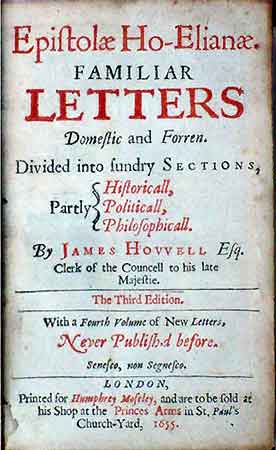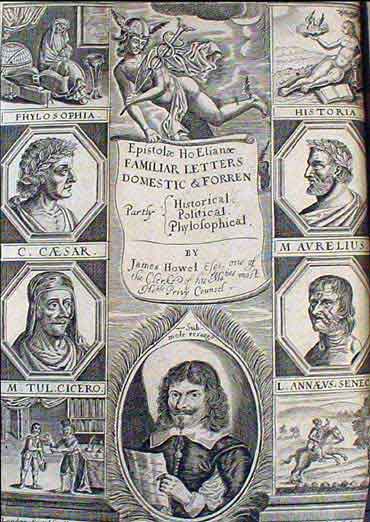
James Howell's Epistolæ Ho-Elianæ
(1645-1655)
 |
James Howell (1594?-1666) was Welsh-born, and educated at Jesus College in Oxford. He spent a fair proportion of his youth searching for a vocation, and served at various times as a diplomat, private secretary, and, for the Parliament of 1627, an MP (for Yorkshire). His wit and easy manners soon brought him into correspondence and friendship with some of the more important literary, political, and religious figures of his age, including Ben Jonson and Brian Duppa. In 1640, his Royalist tendencies became clear with the publication of his Dendrologia: Dodona's Grove, or the Vocall Forrest, a political allegory in which the increasingly vocal enemies of Charles I (figured here as the Royal Oak) become ravishers of the pastoral paradise that is Stuart England. His loyalism was reward in 1642 by an appointment as Clerk of the King's Privy Council. This triumph, however, was short-lived, for he was imprisoned by order of Parliament in 1643, and sent to the Fleet Prison where he remained for 8 years. The reasons for his incarceration are unclear: Anthony Wood claims it was (disappointingly) for debt, but it seems more likely that it was his Royalism that made him a target. |
Released in 1650 during a general amnesty from Parliament, he managed to live at peace with the Commonwealth for the remainder of the Interregnum, but was rewarded for his earlier loyalty — and his literary achievements — by an appointment as Historiographer Royal upon the return of the King in 1660.
| Epistolæ Ho-Elianæ (the "letters of Howell") was issued in four volumes, in 1645, 1647, 1650 and 1655; much of the last two volumes were written during his time in prison. The Epistolæ are, as the name suggests, a series of "familiar letters" written to a very diverse collection of friends and associates over the course of more than thirty years. Although most of the letters are quite short, many of the most interesting are, in practice, miniature essays on a wide variety of subjects, ranging from accounts of his travels on the continent in the 1620s, to politics and society, history, philosophy, and aesthetics. As literature, they represent a further step in the evolution of both the "letter" and the "essay" as a literary forms. They are also anticipations of what was to become the dominant discursive prose style of the Restoration: chatty, informal, witty, and gentile. The fold-out engraving that serves as a frontispiece for the third volume serves as an interpretive guide to the contents: the Muses of Philosophy and History appear in the top corners, while engraved busts of Julius Cæsar, Marcus Aurelius, Cicero and Seneca look on approvingly. In the centre, a banner giving the title of this collection of letters is unfurled, appropriately, by Mercury, the messenger of the Olympian gods. |  |
|
XXIV.
To Sir William Boswell, at the Hague, |
||
|
SIR, That
black tragedy which was lately acted heer, as it hath fill'd most hearts
among us with consternation and horror, so I believe it hath bin no less
resented abroad; For my own particular, the more I ruminat upon it, the
more it astonisheth my imagination, and shaketh all the cells of my brain,
so that sometimes I struggle with my faith, and have much adoe to believe
it yet: I shall give over wondring at anything heerafter, nothing shall
seem strange unto me, only I will attend with patience how England
will thrive now that she has let bloud in the basilicall veine
and cured, as they say, of the Kings Evill. |
||
|
Sir,
|
||
|
Fleet, 20 of Mar. |
Your most humble servitor, J. H. |
|
| Transcribed from Jame Howell, Epistolæ Ho-Elianæ. Familiar Letters Domestic and Forren. (London, 1655) 3: 36. |
Images reproduced from:
| Howell, James. Epistolæ Ho-Elianæ. Familiar Letters Domestic and Forren. Divided into Sundry Sections, |
|
|
ESTC: r23382; Wing H3073 and H3078 (Fourth Volume) |
References and Further Reading
|
Howell, James. Instructions for Forreine Travell. 1642. Collated with the Second |
|
[Includes a "Short Account" of Howell.] |
|
Howell, James. Epistolæ Ho-Elianæ; The Familiar Letters of James Howell. Ed. W.H. |
|
|
|
Vann, W. H. Notes on the Writings of James Howell. Waco, 1924. |
|
|
[Available through interlibrary
loan]
|
|
Motten, J. P. Vander. "James Howell's Instructions for Forreine Travell (1642): The |
|
|
Nauman, Jonathan. "A New Poem Is New Evidence: Henry Vaughan and James |
|
|
Sanchez Escribano, F. Javier. "The Spanish Match through the Texts: Jonson, |
|
|
[Available through interlibrary
loan]
|
|
Woolf, Daniel. "Conscience, Constancy, and Ambition in the Career and Writings of |
|
 |
Website maintained by: Mark
McDayter
Website administrator: Mark McDayter
Last updated: April 25, 2002